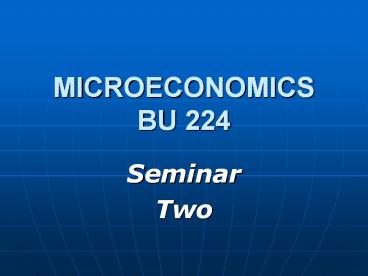MICROECONOMICS BU 224 - PowerPoint PPT Presentation
1 / 37
Title:
MICROECONOMICS BU 224
Description:
The inhabitants grow corn and breed poultry. The accompanying table shows the maximum annual output combinations of corn and poultry that can be produced. – PowerPoint PPT presentation
Number of Views:120
Avg rating:3.0/5.0
Title: MICROECONOMICS BU 224
1
MICROECONOMICSBU 224
- Seminar
- Two
2
Agenda
- Course Issues and Questions
- Models
- Production Possibilities Curve
- Comparative Advantage
- Circular Flow
- Positive and Normative Economics
- Review of Questions from the Text
- Homework
3
What is an economic model?
- A simplified description of reality used to
understand and predict the relationships between
variables
4
What is the purpose of an economic model?
- To forecast or predict the results of various
changes in variables
5
What is thescientific method?
- Problem identification
- Model development
- Testing a theory
6
Identify the problem
Develop a model basedon simplified assumptions
Test the model and formulate a conclusion
7
What conclusion can we make?
- If the evidence supports the model, the
conclusion is to accept the model. If not, the
model is rejected
8
What is the difference between association and
causation?
- We cannot always assume that when one event
follows another, the first caused the second
9
What are resources?
- The basic categories of inputs used to produce
goods and services
10
What are the three categories of resources?
- Land
- Labor
- Capital
11
What is aland resource?
- A shorthand expression for any natural resource
provided by nature
12
What is labor?
- The mental and physical capacity of workers to
produce goods and services
13
What is capital?
- The physical plants, machinery, and equipment
used to produce other goods, they do not directly
satisfy human wants
14
What isfinancial capital?
- The money used to purchase capital. Financial
capital by itself is not productive, it is a
paper claim on capital
15
What is entrepreneurship?
- Creative labor of individuals that enables them
to seek profits by combining resources
16
Labor
Land
Capital
Entrepreneurship organizes resources to produce
goods and services
17
What is a production possibilities curve?
- A curve that shows the maximum combinations of
two outputs that an economy can produce, given
its available resources and technology
18
What is technology?
- The body of knowledge and skills applied to how
goods are produced
19
What assumptions underlie the productions
possibilities model?
- Fixed resources
- Fully employed resources
- Technology unchanged
20
(No Transcript)
21
What iseconomic growth?
- The ability of an economy to produce greater
levels of output, an outward shift of its
production possibilities curve
22
Economic growth
Technological advance
23
Technological Advance
Computers
Pizzas
24
What is the conclusion of the production
possibilities curve?
- Scarcity limits an economy to points on or below
its production possibilities curve
25
On average, households in China save 40 percent
of their annual income each year, whereas
households in the United States save less than 5
percent. Production possibilities are growing at
roughly 9 percent annually in China and 3.5
percent in the United States. Use graphical
analysis of present goods versus future goods
to explain the differences in growth rates
26
(No Transcript)
27
Comparative vs. absolute advantage
- Comparative advantage the opportunity cost of
producing the good is lower for that individual
than for other people. - Absolute advantage if he or she can do it better
than other people. - Careful Dont confuse comparative advantage with
absolute advantage!
28
Comparative Advantage and Gains from TradeEx.
Tom and Hank
29
Tom and Hanks Opportunity Costs of Fish and
Coconuts
Both castaways are better off when they each
specialize in what they are good at and trade.
30
Specialize and Trade
31
(No Transcript)
32
What ispositive economics?
- An analysis limited to statements that are
verifiable
33
What isnormative economics?
- An analysis based on value judgement
34
Chapter Two Questions
- 9. Are the following statements true or false?
Explain your answers. - When people must pay higher taxes on their wage
earnings, it reduces their incentive to work is
a positive statement. - b. We should lower taxes to encourage more work
is a positive statement. - c. Economics cannot always be used to completely
decide what society ought to do. - d. The system of public education in this
country generates greater benefits to society
than the cost of running the system is a
normative statement. - e. All disagreements among economists are
generated by the media.
35
Unit Two Homework Questions
St Atanagio is a remote island in the Atlantic.
The inhabitants grow corn and breed poultry. The
accompanying table shows the maximum annual
output combinations of corn and poultry that can
be produced. Obviously, given their limited
resources and available technology, as they use
more of their resources for corn production,
there are fewer resources available for breeding
poultry.
a. Draw a production possibility frontier with
corn on the horizontal axis and poultry on the
vertical axis illustrating these options, showing
points 17.
36
Unit Two Homework Questions
2. Can St. Atanagio produce 650 pounds of poultry
and 650 pounds of corn? Explain. Where would this
point lie relative to the production possibility
frontier? 3. What is the opportunity cost of
increasing the annual output of corn from 800 to
1000 pounds? 4. What is the opportunity cost
of increasing the annual output of corn from 200
to 400 pounds? 5.Can you explain why the
answers to parts 3. and 4. above are not the
same? What does this imply about the slope of the
production possibility frontier?
37
Microeconomics
- Questions?



























![[DOWNLOAD]⚡️PDF✔️ Principles of Microeconomics Third Edition PowerPoint PPT Presentation](https://s3.amazonaws.com/images.powershow.com/10098785.th0.jpg?_=202408140210)
![[PDF] DOWNLOAD Principles of Microeconomics Third Edition PowerPoint PPT Presentation](https://s3.amazonaws.com/images.powershow.com/10099598.th0.jpg?_=202408150410)


